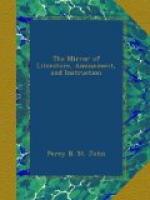Felt it till a year departed—
Felt it of all hope bereft;
Restless, joyless, broken-hearted,
Then the warring bands he
left;—
Bade on Joppa’s sandy shore
Seamen hoist the swelling
sail;
Swift the bark to Europe bore
O’er the tide the fav’ring
gale.
When the pilgrim, sorrow laden,
Sought the gates he lov’d
so well;
From the portals of his maiden
Words of thunder[3]
rang his knell:
“She ye seek has ta’en the
veil,
To God alone her thoughts
are given;
Yestere’en the cloisters pale
Saw the bride betroth’d
to heaven.”
From the castle of his sires,
Mad with grief, the hero flew;
War no more his bosom fires,
Arms he spurns, and courser
true.
Far from Toggenburg alone
Wends he on his secret way,
To friend and foe alike unknown,
Clad in peasant’s mean
array.
On a mountain’s lonesome glade,
’Neath a hut he sought
repose—
Near where ’mid the lime-tree’s
shade,
The convent pinnacles arose;
There, from morning’s dawn first
bright’ning
Till the ev’ning stars
began,
Secret hopes his anguish light’ning,
Sate the solitary man.
On the cloister fixed his eye,
Thro’ the hours’
weary round,
To his maiden’s lattice nigh,
Till he heard that lattice
sound—
Till that dearest form was seen—
Till she on her lover smil’d—
And the turret-grates between
Look’d devout and angel-mild.[4]
There he sate thro’ many a day,
Thro’ many a year’s
revolving round—
Alike to hope and grief a prey,
Till he heard the lattice
sound.
Years were fleeting; when one morning
Saw a corse the cloister nigh—
To the long-watch’d turret turning
Still its cold and glassy
eye.
H.
[2] Literally translated.
[3] Donnerworte.
[4] Engelmild.
* * * * *
CORFE CASTLE—EDWARD II.
(To the Editor.)
I should be glad to be informed by your correspondent, James Silvester, Sen., on what authority he grounds his assertion (contained in No. 484.) that it was in the fortress of Corfe Castle that the unfortunate Edward ii. was so inhumanly murdered. I have always, considered it an undisputed fact that the scene of this atrocity was at Berkeley Castle, in Gloucestershire. Hume states, that while in the custody of Lord Berkeley, the murderers, Mautravers and Gournay, “taking advantage of Berkeley’s sickness, in whose custody he then was, came to Berkeley Castle, threw him on a bed,” &c. &c. giving the particulars of the cruel deed. An abridged history, the only other authority I have at hand to refer to, says, “After these transactions, he was treated with the greatest indignities, and at last inhumanly murdered in Berkeley Castle, and his body buried in a private manner in the Abbey Church, at Gloucester.” The lines of Gray, in his celebrated poem of “The Bard,” are familiar to most school-boys, where he alludes to the cries of the suffering monarch




